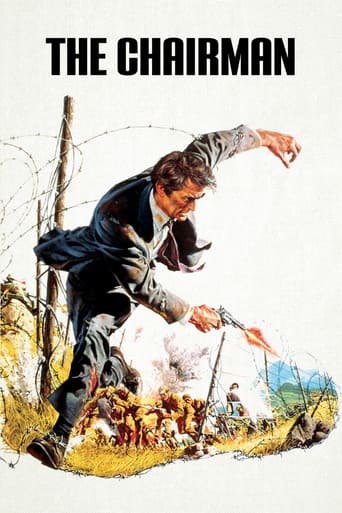zardoz-13
"Guns of Navarone" director J. Lee Thompson and leading man Gregory Peck teamed up for the fourth time in the Cold War era thriller "The Chairman," but this preposterous spy thriller has little to distinguish it aside from its gimmick. When an agricultural enzyme enables the Red Chinese to grow crops despite adversarial climate conditions, the Americans dispatch an American scientist, Dr. John Hathaway (Gregory Peck of "MacKenna's Gold"), to go to China and confabulate with his old colleague from his Princeton days. Now, the gimmick is that the Americans have planted a small plastic receiver in the back of his head that allows him to talk to them about his progress without relying on any external device. Basically, aside from showing our well-dressed protagonist what he has in his head, this film doesn't have to worry about concealing some costly electronic device. Meantime, the suspicious Red Chinese cannot figure out how our hero is communicating with the Americans. After a long, tedious build up that includes a meeting with Chairman Mao during a ping-pong game, Hathaway has to make a desperate bid for the border. Thompson cuts back and forth between Hathaway and the American military who keep tabs on his progress. Gregory Peck wears his trench coat well, but he is no more convincing as a scientist than he is a spy. What a dreary mess with a last-minute revelation that develops little tension.
ma-cortes
An American scientific named Hathaway (Gregory Peck, after his acting in Stalking moon), Nobel prize winner , is enlisted by British Intelligence Service and assigned Mao's Red China to retrieve a formula about a revolutionary agricultural enzyme that eliminates starvation , diseases and multiply mass production . His chiefs (Arthur Hill , Alan Dobie) have implanted a microchip in his head for placing him in the solitary mission whose unique contact results to be Chang (Burt Kwouk , usual in Peter Sellers' Pink Panther). But he doesn't know that it can be exploded if the mission fails . Hathaway leaves his girlfriend Kay (Anne Heywood) and aboard airplane to Hong Kong . Later on , he's transported to north of China , nearly Russia , where he finds professor Soon Li (Keye Luke, the clever master in Kung-Fu series). There Hathaway interviews President Mao (Conrad Yama) .This is a political/fiction/thriller , plenty of intrigue , suspense and action-packed in its final part . The film is an espionage story originally written by Ben Maddow with historic communist remarks during Mao Tse Tung period , as the'Great leap' and 'Red book of Mao'. In fact , there had propaganda campaigns mounted by Hong Kong communists claiming the film was anti Mao and anti Chinese consequently filming was transferred to Taiwán . Stars Gregory Peck who gives nice acting , though originally intended to be as a starring vehicle for Frank Sinatra . It packs colorful and evocative cinematography , shot in Pinewood studios of London , by John Wilcox and uncredited Ted Moore . Atmospheric production design , it was used the lab set left over from Fox's Fantastic voyage (1966). Moving and suspenseful musical score by the great master Jerry Goldsmith .The film is lavishly produced by Mort Abrahams and Arthur P. Jacobs who previously produced 'Planet of apes' . The motion picture was middlingly directed by J.L. Thomson (1914-2002) , during his splendor and successful time in the 60s , when he directed hits as 'Mackenna's gold' , 'Cape fear' , 'Taras Bulba' and 'Guns of Navarone' ; though in his last period he only directed Charles Bronson vehicles , such as : 'Death wish 4' , 'Kinjite' , 'St Ives' , 'Messenger of Death' , among others . The movie will appeal to Gregory Peck devotees.
Tristan Gong
I am interested in Hollywood movies about China all the time. 55 Days in Beijing, Seven Years in Tibet, Red Corner... I happened to see the Chairman and bought it without any hesitation. But, it turned out to be a complete disappointment not because performance and scenery but true China. In fact, I hate Mao's dictatorship in Red China, however, apparently, American people didn't and could't know much about Red China in 1969. In this movie, the starting music made me believe it was about Japan, what's worse, the Japanese-style-music was all through the movie. And, in 1969, Americans could not find anyone who can speak Mandarine well. What they could find was some Hong Kong-accent guys whose Mandarine made me confused and giggle. When I saw the Chairman, I realized the worst part began. Mao Zedong became much shorter and less-arrogant. He spoke English! Others Mandarine. From the very beginning, I could not find any clues about China Mainland. Everything was falsed too bad. I wondered if you shot the movie without getting a Chinese as a history adviser.
Penfold-13
Gregory Peck is a scientist. He is sent on a mysterious mission to China, where it turns out a scientist has developed an amazingly beneficial enzyme, and thinks Peck is the only man who can work out how to duplicate it for mass production, cure all known diseases, etc. Peck and said scientist are idealists who want to share it with the world, while the US and Chinese governments just want it for themselves. And, to make the whole thing more credible, Peck is equipped with a micro-transmitter in his brain which monitors his physical status and bugs his every conversation, including the one he has after playing table tennis with Chairman Mao.It sounds silly, and, frankly, it is, but the espionage and the attempts to detect it are fairly tense, and Gregory Peck indulges in a fair number of good old humanitarian rants which suggest that Chinese totalitarianism and US militarism aren't necessarily wonderful things either.I rather enjoyed it.




